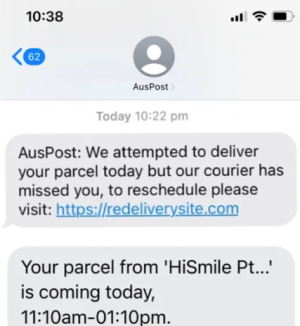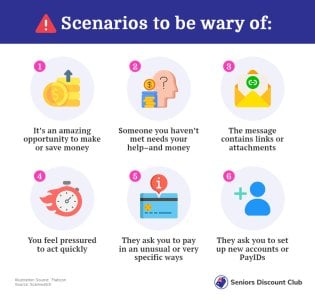Australia Post issues warning about text scams: 'Don’t trust it'
By
VanessaC
- Replies 23
As the holiday season approaches, Australians are being urged to stay vigilant against a new wave of scams targeting Australia Post customers.
The warning comes in the wake of a change in the postal service's delivery process, which has inadvertently opened a new avenue for scammers to exploit.
Australia Post recently discontinued its 'attempted delivery' cards, opting instead to notify customers of undelivered packages via text messages or app notifications.
This is the first Christmas season with the new process in place, and it's causing some confusion among customers, providing a perfect opportunity for scammers to strike.
NSW Police have shared an image of a fraudulent text message that masqueraded as an official Australia Post notification.
The message prompts recipients to click on a suspicious link, potentially exposing them to malware or phishing attempts.
Authorities have urged Australians not to share personal details or click on any suspicious links.
'If you've made an order, verify the message's authenticity by using the official Australia Post website,' NSW Police advised.
Australia Post has reiterated that it would 'never contact anyone via SMS or email asking for personal or financial information or payments'.
The postal service has also provided examples of the types of texts it will send to help customers distinguish between legitimate notifications and scams.
You can watch this video on how to spot SMS phishing scams from AusPost below:
Video source: Youtube/Australia Post.
'We’re seeing a greater public awareness of scams and cybersecurity. However, we encourage customers to be aware of how to spot a scam, including looking for a non-Australia-Post web address and unusual sense of urgency,' a spokesperson said.
Australia Post is urging customers who receive suspicious messages appearing to be from the postal service to report them to [email protected] and delete them immediately.
The rise of online scams in Australia is alarming.
Last year, Australians lost a record $3.1 billion to scammers, marking an 80 per cent increase from the previous year.
Scamwatch, the Australian Competition and Consumer Commission's scam information service, has issued a list of scenarios to be wary of:
If you, or anyone you know, suspect that you’ve been a victim of a scam, you may take the following steps:
This warning comes after a family awaiting an international delivery, but had not been given a tracking number, shared the dubious texts they received from a scammer pretending to be Australia Post.
The texts included a convincing preview link that could easily fool people into thinking they would be redirected to an Australia Post help page, where they can reschedule delivery or arrange a pick-up.
Users on social media were quick to point out that the website address given in the text didn't match Australia Post's official website.
You can read more about this incident here.

Remember, if something seems too good to be true, it probably is. Stay safe this holiday season, dear members!
Have you encountered any suspicious messages or scams recently? Share your experiences with us in the comments below to help raise awareness among our community.
The warning comes in the wake of a change in the postal service's delivery process, which has inadvertently opened a new avenue for scammers to exploit.
Australia Post recently discontinued its 'attempted delivery' cards, opting instead to notify customers of undelivered packages via text messages or app notifications.
This is the first Christmas season with the new process in place, and it's causing some confusion among customers, providing a perfect opportunity for scammers to strike.
NSW Police have shared an image of a fraudulent text message that masqueraded as an official Australia Post notification.
The message prompts recipients to click on a suspicious link, potentially exposing them to malware or phishing attempts.
Authorities have urged Australians not to share personal details or click on any suspicious links.
'If you've made an order, verify the message's authenticity by using the official Australia Post website,' NSW Police advised.
Australia Post has reiterated that it would 'never contact anyone via SMS or email asking for personal or financial information or payments'.
The postal service has also provided examples of the types of texts it will send to help customers distinguish between legitimate notifications and scams.
You can watch this video on how to spot SMS phishing scams from AusPost below:
Video source: Youtube/Australia Post.
'We’re seeing a greater public awareness of scams and cybersecurity. However, we encourage customers to be aware of how to spot a scam, including looking for a non-Australia-Post web address and unusual sense of urgency,' a spokesperson said.
Australia Post is urging customers who receive suspicious messages appearing to be from the postal service to report them to [email protected] and delete them immediately.
Last year, Australians lost a record $3.1 billion to scammers, marking an 80 per cent increase from the previous year.
Scamwatch, the Australian Competition and Consumer Commission's scam information service, has issued a list of scenarios to be wary of:
If you, or anyone you know, suspect that you’ve been a victim of a scam, you may take the following steps:
- Contact your bank immediately and ask them to halt any transactions or prevent further money from being sent.
- Report the scam to Scamwatch and lodge an official complaint with the police.
- Be cautious of follow-up scams, particularly those promising to recover your lost money.
- Seek support for yourself. You can consult a financial counsellor or reach out to BeyondBlue on 1300 22 4636 or Lifeline on 13 11 14 for emotional support.
- Contact IDCARE, a national identity and cyber support service, to 'reduce the harm they experience from the compromise and misuse of their identity information by providing effective response and mitigation'.
This warning comes after a family awaiting an international delivery, but had not been given a tracking number, shared the dubious texts they received from a scammer pretending to be Australia Post.
The texts included a convincing preview link that could easily fool people into thinking they would be redirected to an Australia Post help page, where they can reschedule delivery or arrange a pick-up.
Users on social media were quick to point out that the website address given in the text didn't match Australia Post's official website.
You can read more about this incident here.
Key Takeaways
- Australia Post customers are being warned of scammers who are taking advantage of changes in the parcel delivery process.
- NSW Police advise people to verify the authenticity of any messages they receive by checking the official Australia Post website.
- Australia Post has stated it will never ask for personal or financial information via SMS or email. Suspicious messages should be reported to [email protected] and deleted immediately.
- Australians reportedly lost $3.1 billion to scammers last year, an 80 per cent increase from the previous year.
Have you encountered any suspicious messages or scams recently? Share your experiences with us in the comments below to help raise awareness among our community.
Last edited:









